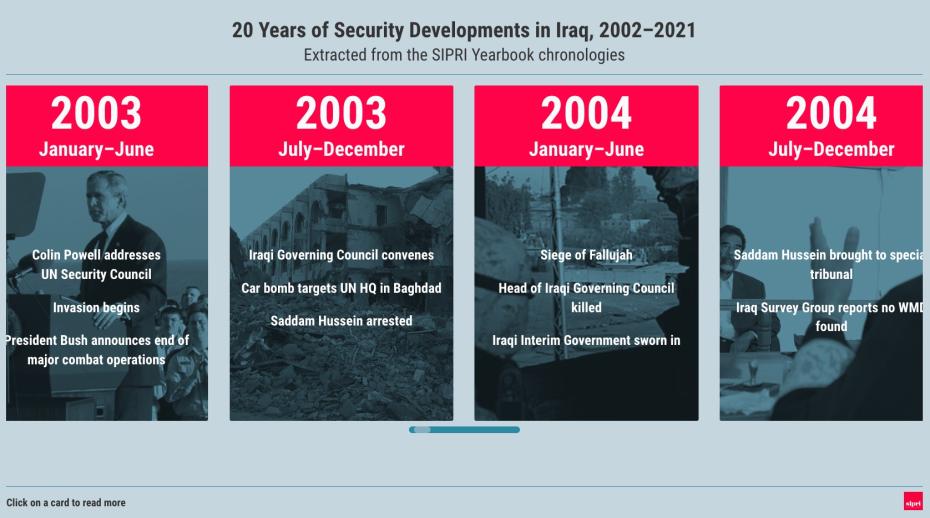
On 20 March 2003 (CET), US President George W. Bush announced the start of Operation Iraqi Freedom—the invasion of Iraq by a multinational military coalition with the stated aims to ‘disarm Iraq, to free its people, and to defend the world from grave danger’.
Since the invasion, Iraq has suffered protracted and devastating periods of conflict and has been riven by ethno-sectarian divisions. It remains politically and economically fragile. The invasion also had profound impacts on regional and international security.
To mark the 20th anniversary of the invasion, SIPRI has released a collection of new materials looking back over the months leading up to Operation Iraqi Freedom and developments over the two decades since.
Key dates and data: interactive chronology and topical backgrounder
Last week, SIPRI published an interactive chronology of security-related developments in Iraq, drawing from the SIPRI Yearbook archive. The chronology details critical events from US President George W. Bush’s famous ‘axis of evil’ speech in January 2002, through the years of counterinsurgency and reconstruction, the rise and fall of Islamic State in Iraq, to the talks on ending the renewed US troop presence in Iraq in July 2021.
Alongside the chronology, SIPRI released a topical backgrounder presenting 20 years of SIPRI data on Iraq. The backgrounder looks at Iraq’s military spending, arms imports and engagement in assistance activities aimed at strengthening Iraq’s controls on arms transfers and on small arms and light weapons. The backgrounder also profiles the multilateral peace operations deployed in Iraq since 2003.
Video interviews with Rolf Ekéus and Hans Blix
A central pillar of the US and British case for invading was claims that Iraq was secretly developing weapons of mass destruction (WMD)—claims that were later revealed to be entirely wrong. SIPRI has filmed new interviews with two of the leaders of the United Nations weapons inspection teams that operated in Iraq in the 1990s and the months leading up to the invasion.
Ambassador Rolf Ekéus was Executive Chairman of the UN Special Commission (UNSCOM) in Iraq between 1991 and 1997. Following Iraq’s defeat in the first Gulf War (1990–91), UNSCOM weapons inspectors found and oversaw the destruction of Iraqi missile and nuclear, biological and chemical weapons programmes. In his interview, Ambassador Ekéus reflects on the invasion and the legacy of UNSCOM.
As Executive Chairman of UNSCOM’s successor, the UN Monitoring, Verification and Inspection Commission (UNMOVIC), Dr Hans Blix directed teams of scientific experts who were tasked with resolving the last questions remaining from UNSCOM’s work, and—from November 2002 until the invasion—working on the ground in Iraq to investigate the new claims about Iraqi WMD. In his interview Dr Blix discusses the experience of that critical period and the lessons it offers today.
Robert Kelley on how the UN weapons inspectors in Iraq were sidelined
Robert Kelley worked in Iraq as part of the weapons inspection teams under the International Atomic Energy Agency (IAEA) in both the 1990s and the months leading up to the invasion. In the 1990s, working alongside UNSCOM, the IAEA Action Team helped to uncover, document and dismantle Iraq’s clandestine nuclear weapons programme.
In 2002–2003, the IAEA Action Team was back in Iraq, investigating renewed claims about an Iraqi nuclear weapons programme. In a new essay, Kelley describes how the UN weapons inspectors systematically debunked the WMD claims but found their evidence being disregarded. Instead policymakers and world leaders chose to believe dubious sources and inexperienced analysts, with catastrophic results.
A snapshot of today's Iraq
The final piece in the package is another topical backgrounder by Shivan Fazil and Dr Alaa Tartir of the SIPRI Middle East and North Africa (MENA) programme giving an overview of the progress and challenges for Iraq's security 20 years after the invasion. You may also be interested to read about the MENA programme's ongoing work in Iraq and its neighbours, including inter-community peacebuilding dialogues, analysis of how to address governance challenges facing Iraq, and exploring the role of cultural practices in peacebuilding and reconstruction in the ethno-religiously diverse Nineveh Plains region.
Media contact
For information and interview requests contact Alexandra Manolache, SIPRI Media and Communications Officer (alexandra.manolache@sipri.org, +46 766 286 133).